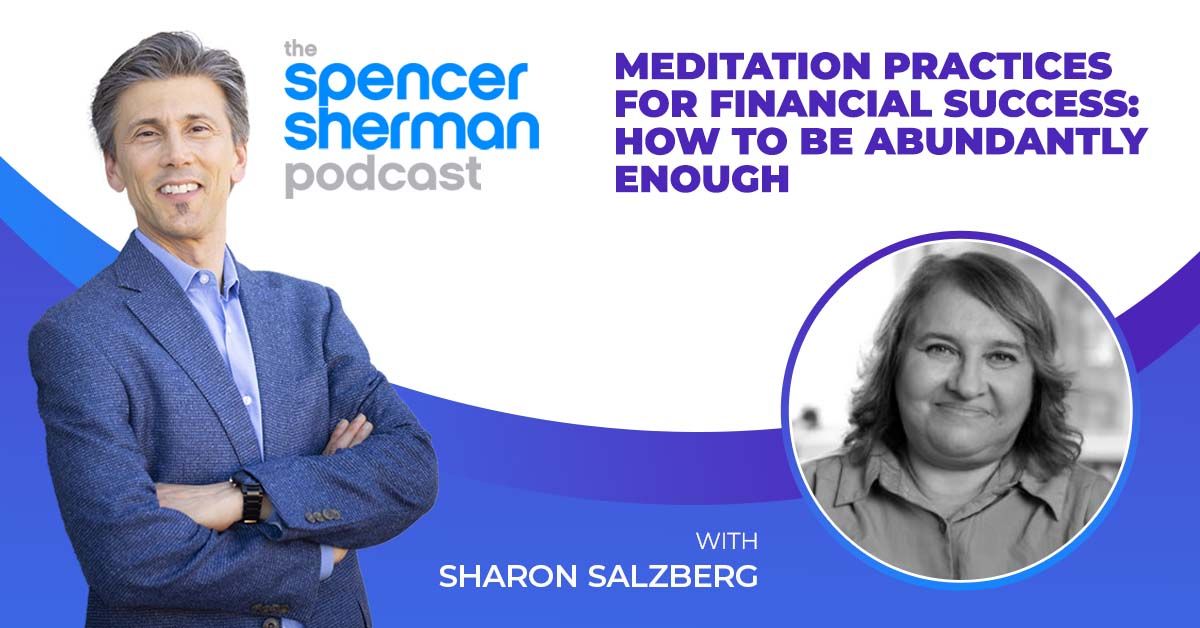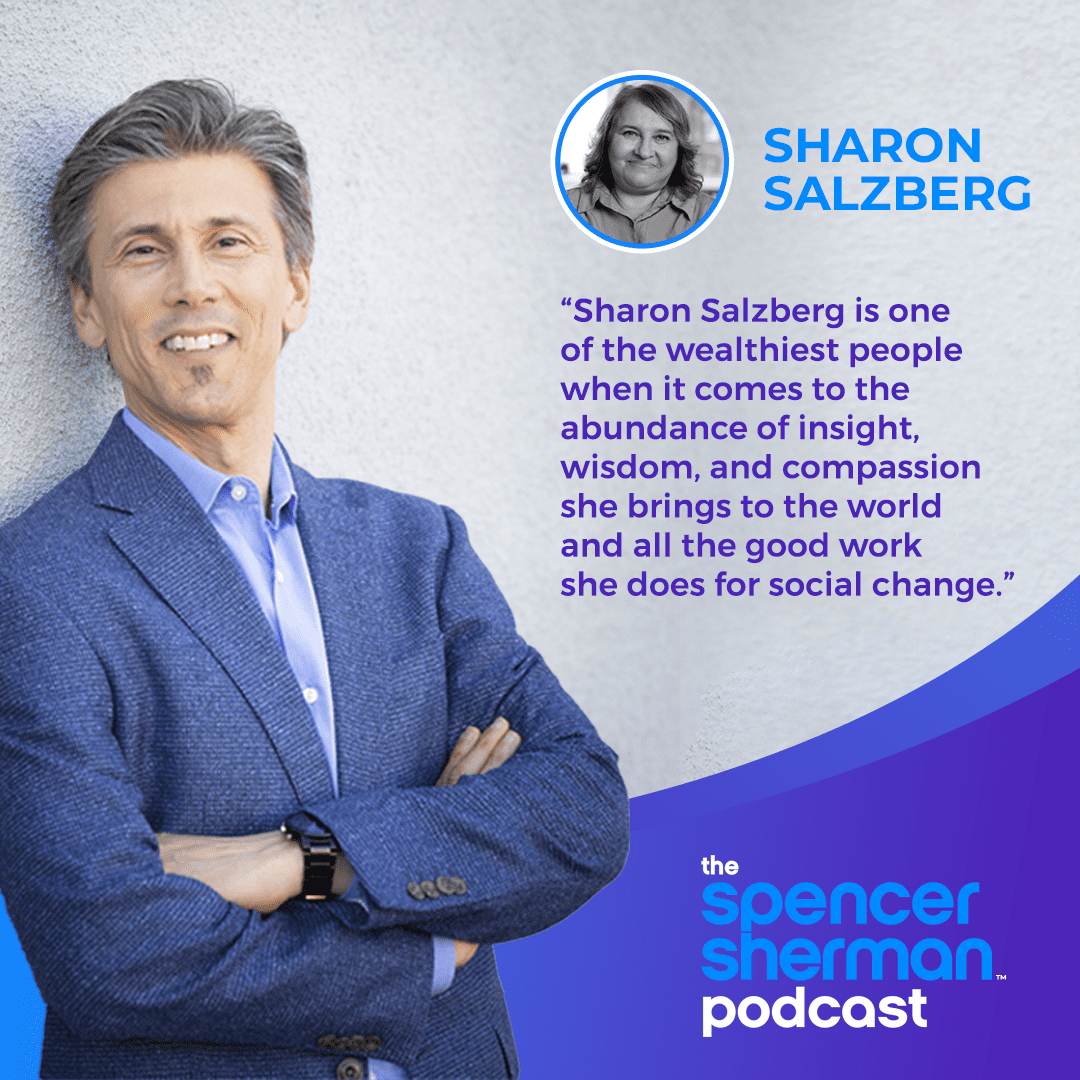
Financial education is more than just knowing what to do with your money. Beyond the 401(k)s, taxes, and investments, it is about digging deep into your financial behavior. What are the limited beliefs and fears that keep you from achieving financial success? In this episode, Spencer Sherman brings over the perfect guest who can help you rethink your relationship with finances. Sharon Salzberg is a renowned meditation teacher and Co-founder of Insight Meditation Society. She brings her expertise on meditation to teach us about the concept of being enough, seeing it not from a place of lack but as a feast. In a world that constantly needs more, relearning what enough is can be transformative. Join Sharon as she talks more about gaining a sense of resilience in a world of impermanence. Learn how to create mindful financial decisions and find financial stability while dealing with constant change.
---
Listen to the podcast here
Meditation Practices For Financial Success: How To Be Abundantly Enough With Sharon Salzberg
This show is all about training our minds for financial success. What I've discovered is that money is like an iceberg. There's the tip of the iceberg: our 401(k) plans, mortgages, taxes, investments, budgeting, and all of that stuff are interesting and necessary, but then there's this submerged or hidden part of the iceberg. That's where our fear and fixed beliefs lie. That's what also often drives our financial behavior. That's why I have with us Sharon Salzberg, a renowned meditation teacher, the person who brought so much of vipassana meditation to the West, and the Cofounder of the Insight Meditation Society. I want to welcome you, Sharon.
Thank you so much. I know this is probably not the usual place where you begin, but I'm very curious. How do you define success?
I define success as having a sense of ease with one's finances, having a sense of purpose with one's finances, and expressing one's values with your finances, not expressing our neighbors' values or the culture's values. That's how I define success. It's having a sense of enough.
That's great because it's a very provocative title.
A journalist asked John Rockefeller, the world's first billionaire. He was richer than Jeff Bezos. He asked him, "How much is enough?" His answer was, "A little bit more." John Rockefeller was not successful. Part of financial success is coming to that sense of enoughness, to ease one's financial situation, making your money situation work for you, and not being in that constant fight or flight mode of needing more.

Maybe we should start there with enough. You have done so much. I fumbled a little bit on the introduction because I was a little bit overwhelmed with all that you've done in your life. It's unbelievable. It's many lifetimes for most of us. You've done it all in not even a lifetime yet. You've written many New York Times bestselling books. You've been this groundbreaking meditation teacher. You've made it accessible to millions of people who have no interest necessarily in Buddhism or serious meditation. They're now gaining the benefits of mindfulness and meditation. I'm wondering, what about you? Do you feel this sense of enough in your life after having achieved so much?
That's also very interesting. First of all, I'm not young. How much I've done has been over a stretch of time.
Most people do what you've done in maybe 30 lifetimes, and you've done it in 1.
Thank you. I have a friend named Shelly Tygielski. She started a mutual aid society called Pandemic of Love. At the beginning of the pandemic, she woke up one morning disturbed about what was happening in the world. She created two Google Docs. One said, "I need help." That might be for rent, utilities, or something like that. The other doc said, "I can offer help." She began pairing people. It's a non-organization. It doesn't take money for itself to distribute. It just pairs people.
It's a worldwide organization. They have distributed something like $60 million. She has a phrase that I like a lot and which I often quote, "Enough is a feast." Many of us have experienced some time in our life when we have not had enough, or maybe currently we feel we don't have enough, but the contrast is not, "This is a relief." It's also a feast. We can stop and appreciate that.
I often say that enough sounds like this boring or limiting idea, but the way I hold it from a Buddhist perspective, it's a very liberating idea. It's close to the idea of equanimity or this idea of being okay with the way things are, and letting go of things needing to be different, especially when we talk about money and needing to have more. There's also this real sense that many of us in this world need more. They need basic food, shelter, clothing, medical care, and all that.
There are so many of us that have all those basic needs but are still wanting more. This idea that enough can be transformative because it puts us into a much more relaxed state in our lives. What I found is that when I'm in that more relaxed state, when I'm coming from that place of enough, I'm making better decisions, particularly in the financial realm.
Maybe an underlying thread would be being able to discern the difference between suffering as we would call it in Buddhism, and you could call it stress or whatever, and what we might call extra suffering. You might be in turmoil and your life in chaos because you don't have an operating car, and you need one. There are very real consequences to not having your means of transportation for some people. It's long wait times for a bus or something like that or not being able to go visit your family.
There's real distress over that, but then there's the extra suffering, which is, "I've only got one car. I need four more. I need to replace it every year. What about my neighbor? Look at what they've got." There are so many ways in which we have cultural conditioning, family conditioning, and personal conditioning. That weighs us down, and we don't need that. Life can be hard enough with real challenges. On top of that, we don't need to add all this other stuff.

What you said about four cars made me think about Jim Carrey, the famous actor because he decided to retire. He was asked, "How can you possibly retire? You're such a good actor. There's so much more you can do." His response was he parroted a lot of what I say when I do my enough meditations. He says, "I have enough. I do enough. I am enough. I think I can retire."
It almost seems like there's an automatic want in our minds for more. He finally got to this place, albeit he has certainly accumulated a lot of money and success, but it's true for many of us that there's this sense of always wanting more and never being enough. I once heard a teacher from the East say that it's particularly an American thing, this idea of not feeling enough. I don't know if you can say anything about that.
It would be interesting to hear from some of your European or South American audiences and people who are not necessarily from the US to hear if that's true. It could be true. It's certainly a very individualistic culture. The kinds of feelings of belonging to other cultures may engender with your family and even extended family or friendships. The network may not be as satisfying here because it's all about us.
That leads people if we don't have a strong foundation of family or friends because that's part of our wealth in some ways. The way I sense it, we're more likely to grasp for more and do impulsive things with our finances because we're trying to fill our cups that are not very full. I see time and time again, and I've been an advisor for 30 years, money itself doesn't do it for most of us.
I'm curious about the decision-making process you encourage. It's not impulsive. It's not letting your emotions run you.
It's not letting your emotions run you, not coming from a place of scarcity, and sensing the enoughness of what you have that might not be money. It might be resources, skills, time, friends, family, and other things that are filling up your sense of enough. Maybe look at the evidence. Talk to people. Maybe you have a friend that can be a sounding board for you.
Make that decision with the full awareness that we each bring some biases to any financial decision. We acquire these beliefs in early childhood. Recognize that. I have had this belief from childhood that money is the most important thing in the world. That's a belief that I got from my dad. I've seen the way it's colored my decisions. The awareness of some of this can be helpful.
I have two questions. You were talking about this suffering that we add on. There's this thing in Buddhism called the second arrow. I don't know if you wanted to say something about that in regard to there's the loss of a job or a setback with our business or the financial markets and what's happening, but then there's the second arrow. Maybe you can share a little bit about that.
That is something that is more in our hands than the disposition of the world market or something. First of all, it's important to recognize that the suffering of loss is genuine. Maybe you had hopes, dreams, and plans, and now it's shaky. In my case, there's myself as an individual. There's also myself as cofounder of an institution that is still existing and that has survived. It has been closed for a year and a half. I would like to think that it will have an ongoing existence well past me and my other cofounders. It needs all the financial stability it can get.
It's important to recognize that the suffering of loss is genuine.
There are decisions to be made on behalf of a larger entity, a family, or an institution. When that doesn't go well, it's painful. That doesn't have to imply selfishness or a bad attitude but the extra suffering, which is the second arrow, is the image of someone being shot by an arrow and using another arrow to dig it out, thereby creating much more harm than what had been created by the first arrow.
Is that second arrow like self-judgment?
It could be self-judgment. It could be a shame. It could be being angry at yourself for loss of control. We never had control.
That's a beautiful thing you said. That's so helpful. That's not your expertise but so many of us in the financial markets have control. We should be able to predict the markets. As soon as Russia invaded Ukraine, I should have known to get out of the market. Somehow, we should know these things. We should be in control. That's what you're talking about the second arrow.
It could be many things, but it's certainly a prime example of it. It could be certainly a shame and a loss of control, which we never had. It could be a lack of impetus, "Why didn't I get out six months ago?" It could be impatience. It's a loss of perspective. It could be the globalization of the flaw instead of, "This is a tough employment market. It's no wonder that I and people with my particular set of skills are having a hard time. This is demanding a lot of patience and a lot of resoluteness." Instead of that, it's like, "I'm a loser. I'm bad. I'm the worst programmer that ever lived. I shouldn't even call myself a programmer." It's going down that road of wholesale condemnation of who we are instead of being realistic, "This is a bad job market."
It can make a world of difference. If you have two people, and one is shaming themselves and the other person is seeing the truth of what's happening but not doing all the shaming and the self-judgment, that person has got some real estate in their mind for something more productive than just shaming themselves.
I wanted to ask you about this. Here we are in this bit of a downturn in many ways. Mortgage rates have gone up a lot. It's a lot harder for people to buy homes as if it was easy before. Now, it got even more challenging. The markets are turned down. There's the prospect that jobs won't be as easy to find even though that hasn't seemed like it manifested yet.
I'm wondering, even though human beings experience all these cycles of ups and downs in our lives, somehow it seems like our minds still believe that it shouldn't be this way. Every time things go south, many of our minds are saying, "Why is this happening? Why didn't I do something about it? This sucks." I'm wondering, what does it take for us to get that this is the natural way of things? What keeps us from fully accepting the idea that impermanence is here to stay?
It's very hard to accept. It's interesting. You, as a counselor, have a certain role in reminding people not just once when they set up their account, I would imagine. It's more like whatever period it is, you're asking people, "Are your goals the same? What about the age you are now? Which one did you want to work?" With specificity, remind people that things are changing instead of this account when you were 45. You're not there anymore.
With specificity, remind people that things are changing.
I was very much brought up in a culture where even death was not talked about. It was like, "If you take care of yourself, things don't have to change." That's somehow the idea I received when I was a child. They didn't say that directly to me, but I didn't get the sense that life is changing. We're aging. The economy goes up and down. Forever, it goes up and down. Yet, when I talk to people, they act with shock when things go down, but isn't this the way of things?
It is the way of things. It's individual, but waiting for things through, being patient, and allowing cycles to unfold.
Patience is a huge virtue when it comes to finances and almost every aspect of life. I love the quote from Jean Rousseau, "Patience is bitter but its fruit is sweet." Especially with the investment markets, it's very easy to see that if one was patient in 2020, the markets rebounded quickly as they did in 2009. Every time there have been setbacks, things have rebounded. Patience usually helps us. It helps us with illnesses and many things to not take unwise action.
I've sprained an ankle. Impatience drives me to keep playing sports and doing things that might keep that ankle from healing more quickly. It's the same with investing or finances. We sometimes take an impulsive action instead of being patient and letting things rebound. I'm wondering. What would you recommend in terms of mindfulness practices that might help us gain a sense of resilience or recognize impermanence?
There are many, and sometimes they build on one another. The question is starting, putting something into practice, and then seeing where it goes. Commonly, we're starting and returning periodically, but starting with an exercise where we choose an object of awareness, which very commonly is something like the feeling or the sensations of the in-and-out breath or the natural normal breath. It's a way of centering. It's a way of not annihilating our thoughts and emotions but getting a little bit of space so we feel more grounded and present. That usually involves choosing that object and placing your attention gently on that object as though to feel one breath and then the next.
When your attention wanders because it will, your mind will jump to the past, the future, judgment, and speculation, or you will fall asleep. There comes the magic moment when you realize, "It has been quite some time since I last felt a breath or whatever it was." That's the moment where we actively practice resilience, letting go of whatever has distracted us, and simply returning our attention to that chosen object. Let's say it's the feeling of the breath. We let go and come back. That's the muscle memory that we're training.
I love that. You're also letting go of any judgments that come up when you get distracted. You're both building up this muscle of resilience. You're learning how to be kinder toward the judgment so that the judgment starts to dissipate because we're not eating them as much. You're also cultivating resilience. Patience is another thing that's in there. This is so powerful. It's slowing us down.
The other thing I'm getting from what you shared is that meditation slows us down. I often say that with money, we speed up because we're in a fight or flight mode with it so often. We learned about money in childhood. We were confused. We didn't know much. We picked up on our parents' fears about money. We hear some things and make up things. We internalize all this emotion around money and these very fixed beliefs around it. This ability to be patient and slow things down is a way of gaining awareness of what's happening with our finances before we leap to something just because we feel this need to fix something that's not quite right or looking to make up for a past loss that we had.
I see that often as people want to almost turn it into gambling with the way they invest money. It’s slowing things down. When you go to the store, you're able to slow down and say, "Do I need this item that's near the register?" They're near the registers so that we do impulse buys. Can we slow ourselves down enough to make a wise decision or a wiser decision? It's so connected. It's the antidote to a lot of our impulsivity and speediness with money from what I'm hearing you say. Are these mindfulness practices?
I do want to add on top of that foundational practice of choosing an object and resting your attention on it, we also practice very much what you described earlier. Experiencing some difficult emotions like anxiety but without so much adding that second arrow, and that’s a whole level of practice. It's a whole training in and of itself.
That's great because what I also talk about is that being successful with one's finances takes this ability to be with some of those difficult feelings. That's what you're saying. If we can cultivate a practice that allows us to get curious about the difficult feelings that are arising, we're less likely to act out and more likely to seek the sounding board of the council of a good friend or a professional financial advisor and get some insight into our situation instead of, "I can't stand this fear I'm feeling inside. I'm going to go on Amazon and do something about the fear instead of being with it. I'm feeling all this fear. I'm going to take any job that comes my way."
Maybe that's the right thing in some cases, but often what I hear is people doing things in response to that fear. Taking a new job, doing something with their investments, or buying something, it’s not coming from a place of wisdom. It's coming from a place of being scared. That's powerful. These practices and what you teach are so simple, yet they bring us so many internal benefits. What I'm saying is also external benefits in terms of our finances.
It is interesting. It's putting it into practice.
I want to ask you about our values. It's anything that you can offer us. How do we discover our values in terms of what we spend money on, for example, or how we live, and let go of all the noise around us and all the conditioning that we have on how we should be spending our money? How do we get to what's going to serve us?
We pay attention. We have a gift of awareness. Most of us have been taught so many myths and distortions about things. It's through the force of our awareness that we get to see for ourselves. Many people are taught, for example, that something like a practice of generosity is foolish. You end up with not as much. People don't appreciate you. They come and go on their way, but when we look at what it feels like internally in the process of giving and then what it feels like with the 50 fears that ensue, I have this impulse to give somebody a book or a strong desire to give somebody a book.
I start thinking, "It's near the top of my pile. It has been there for four years, and I haven't read it but maybe I'll read it next month." We can see the hesitation, the withdrawal, and the fear. We get to notice what that feels like too. For whatever reason, we do go ahead with the act of generosity. We get to pay attention to what it feels like when we do that and what it feels like afterward. Do we ever regret the object that we didn't even quite remember we had because it was in storage?
It's because of the power of our attention and the ability to form an intention, "This month, I'm going to see what it's like. I'm going to experiment. Every time I have the chance to give something, I will. It may not always be material. Maybe it's smiling at somebody or thanking them. I'm going to practice generosity for this month or this week," or whatever you choose. We take attention and intention together. Everything we do, everything we say, and everything we hold back from doing and saying becomes our medium. It's all about our choice and being creative.

I love this around generosity. Generosity is the antidote to fear and the sense of scarcity with our finances. People often say, "How can I be generous if I don't have anything? I can't pay my bills." You can be generous with very small amounts of money. The brain doesn't necessarily know how much you're giving away. It knows you're being generous. You can do it with a smile, with your resources, or with your time. You can be generous. That has a great impact on our minds and our ability to feel differently about ourselves when it comes to our finances.
Generosity as a practice is interesting. In your example, we often are holding onto things like that book that we keep saying we're going to read next year and never get to it. It's almost like we have these easy opportunities to be generous. It's anything you've done that's enabled you to get over that last hump of fear, "I can't give this book away. I'm going to read it this year," but I've been saying that to myself for the last few years.
Personal resolve may come in, "I want to experiment with being different this month, this year, or whatever it is." You do that as an adventure. Sometimes a community comes in. It's like that particular example. Having a strong impulse to give something and then giving it despite fears that may arise in between is something that the community up here in Barre has experimented with as a group because then you get to share, "I gave that away, and I was so freaked out." You can be honest about your experience. There's no failing.
Has that ever happened to you where you gave away something, and then you were freaked out that you gave it away?
Never.
I don't think it's happened to me either. That is interesting. At least, I don't remember it. Once I give it away, it's gone. I don't end up missing it, but there is that moment right before I'm giving it away, "What if I need this?" I gave somebody a sleeping bag. I have five sleeping bags but it was like, "Maybe I'm going to invite a bunch of friends, and none of them will have sleeping bags." It was so liberating to give that sleeping bag away to somebody.
That's where the community can play a role because we can encourage one another.
Community can play a role because we can encourage one another.
This idea of generosity sounds so Pollyanna in a way but it's deep. I know that in Eastern culture, generosity is even a bigger part of their culture than it is here. I've heard in Burma and other places that generosity is emphasized more. Is that your sense?
Every culture is so complicated. It's hard to say. It is true that in the world that I touched upon in a country like Burma where I was staying in retreat centers or monasteries, the whole core of it was generosity because in many, if not most of those places, you're not charged anything. You're not even charged for room and board because the people come and feed you. They offer food. Let's say it's your birthday. In Burma, you don't expect to celebrate by getting gifts. You expect to celebrate by giving gifts. That's how you celebrate. Maybe the family goes off to the monastery and offers enough food for as many people as they can afford to feed.
There was a study done here in the West about giving college students $20. Some were told to use the $20 on themselves. Some were told to use it on somebody else. When they measured happiness, they found the ones who bought something for somebody else had a bigger increase in their happiness. It's hard to believe this stuff but now, there are studies around it. We have the ability to try these things out in small ways and see if it works for us.
The last question I wanted to ask you about is this. Money is so necessary. It's important, yet maybe it has become too important in our culture. With that is this identification, "My net worth equals my self-worth." There's so much fear around it because it represents so much to us. Is there anything you could say to help shake us loose from this over-identification with money?
Sometimes we do that assessment too, "What's the story I would tell about my life?" This brings us back to the question of values, "What do I care about more than anything?" An interesting addition to that is, "What's the story others tell about me?" A lot of that is conjecture, but we often see things that didn't fulfill their potential or they didn't make as much money as they should have. They're going to regret it when they're dying. I've heard this as well. They didn't take that extra job.
I said to this person who presented that to me, "I don't think that's what we tend to regret when we're dying. I don't think that's what people go through." There are so many stories that we absorb, "You have to function in this or that way. You have to live up to your potential in this precise manner. You need to be able to retire at the age of 65, 70, or something like that."
I was visiting Nepal. I saw a few of my Tibetan meditation teachers. They asked me about one of my colleagues who's older than I am and was thinking about retiring. I said to the first teacher, "They're thinking about retiring." They said, "They can't retire." They would use the phrase, "People who are committed to the well-being of others don't retire." Cleverly enough, he says, "He can give up administrative tasks for the retreat center or being on the board of directors but he can't stop teaching." I saw another Tibetan teacher, a lama. They asked me how this person was. I said, "They're thinking of retiring." They said, "They can't retire. People like that don't retire."
If you love what you do, why retire from it? What is retirement about? I sometimes define retirement as retiring from the things you don't love doing or don't feel are enabling you to give your greatest gifts. You're tired of those things that aren't serving you but otherwise, I feel like most of us want to be put to use. That's what often keeps us. I've had so many clients of means who have completely retired and then gone back to find meaningful work.
That would be my suggestion. Instead of planning your retirement, plan for finding meaningful work in your 30s and 40s. Find that work that you can do for a long time. You might do it in some different forms. You may still work for 40 hours a week in your 60s or 70s. We need the wisdom of people in their 60s, 70s, and 80s continuing to be in the workforce. We all benefit from them.
I have so benefited from this chat with you, Sharon. I appreciate you and all your wisdom and your abundance. You might not be the wealthiest person when it comes to money in the world, but you are one of the wealthiest people when it comes to this abundance of insight, wisdom, and compassion that you bring to the world and all the good work that you do for social change. There's so much abundance that you bring forward for many beings. It feels so good to be among such a "wealthy" person. Nobody has ever called you that before but I think of you as very wealthy.
Thank you so much. I think of myself as very lucky.
You know what I'm saying when I say wealthy. There's this great line, "Some people are so poor, all they have is money." It's having so much more than just food, clothing, and shelter in your life. Thank you so much for all that you bring forward. Thank you, Sharon Salzberg. Sharon Salzberg can be found at SharonSalzberg.com. Sign up for her newsletter or her events. I'm looking forward to more, and wishing you well always, Sharon.
Thank you so much.
Important Links
SHARE THIS POST
The road to financial freedom is easier when you share the journey. By signing up for Spencer’s newsletter, you’re joining a growing community of people who’ve found their way to “Enough.”





